Kerry Weber ’04 interviewed Pope Francis
By Michael Hagan ’15, ’19G
On a rainy Tuesday in November, Kerry Weber ’04 and four colleagues from America magazine stood in a room on the ground floor of Casa Santa Marta, the pope’s residence in the Vatican. They were quietly conversing when Weber tapped her colleague on the arm to indicate, “He’s here. Without announcement or fanfare, Pope Francis entered, pushing a wheeled walker, with a seat and a basket underneath that held a cane with a crucifix wrapped at the top. Introductions were made, and the in-person interview with the pope began.
“Before Francis entered, I was very nervous,” Weber said. “Once he was in the room, I didn’t feel the nerves anymore. He put everyone at ease. At that point, I could focus on the job I came to do.”
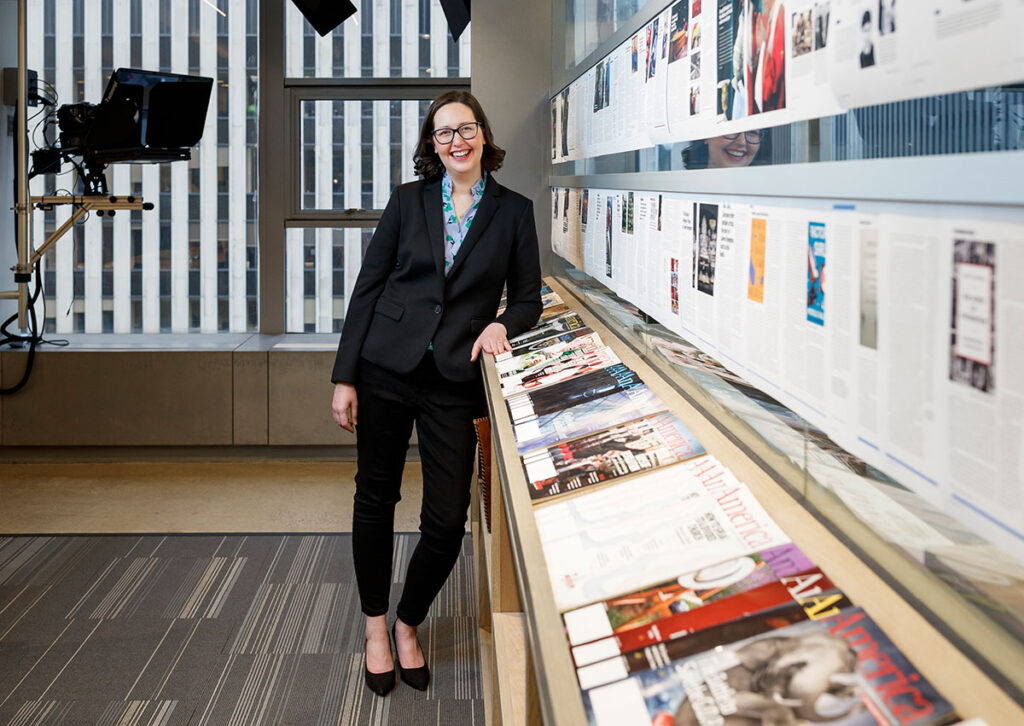
The assignment: to discuss with Pope Francis some of the major questions facing the Catholic Church, the United States, and humanity. Joining Weber, an executive editor at America, were her coworkers: Rev. Matt Malone, S.J., outgoing editor-in-chief; Rev. Sam Sawyer, S.J., incoming editor-in-chief; Gerard O’Connell, Vatican correspondent; and Gloria Purvis, podcast host.
America, a monthly publication of America Media, is a forum for discussion of religion, society, politics, and culture from a Catholic perspective. Continuously published since 1909, it is one of the oldest periodicals in the United States. Weber has worked for America since 2009, after graduating from Columbia University with a master’s degree in journalism. After 12 years living in New York and New Jersey, she now works remotely from her home office in East Longmeadow, Massachusetts, with occasional trips to America’s office in midtown Manhattan.
Weber majored in English at PC and was a student in the Honors Program. She followed in the footsteps of her mother, Peggy Martin Weber ’76 (her father, John, went to Marquette), and her siblings followed her — Matt Weber ’06 is chief creative officer and senior adviser to the president at the University of Virginia, and Elizabeth Weber ’10 lives in western Massachusetts with her husband (and former Civ classmate), Jeremiah Begley ’10, and their four children.
Kerry’s husband, Colm Lynch, who is from Ireland, is a director for Coach USA. They have three children, all of whom drew pictures for the pope. Their 6-year-old son requested that Weber ask the pope about his favorite animal.
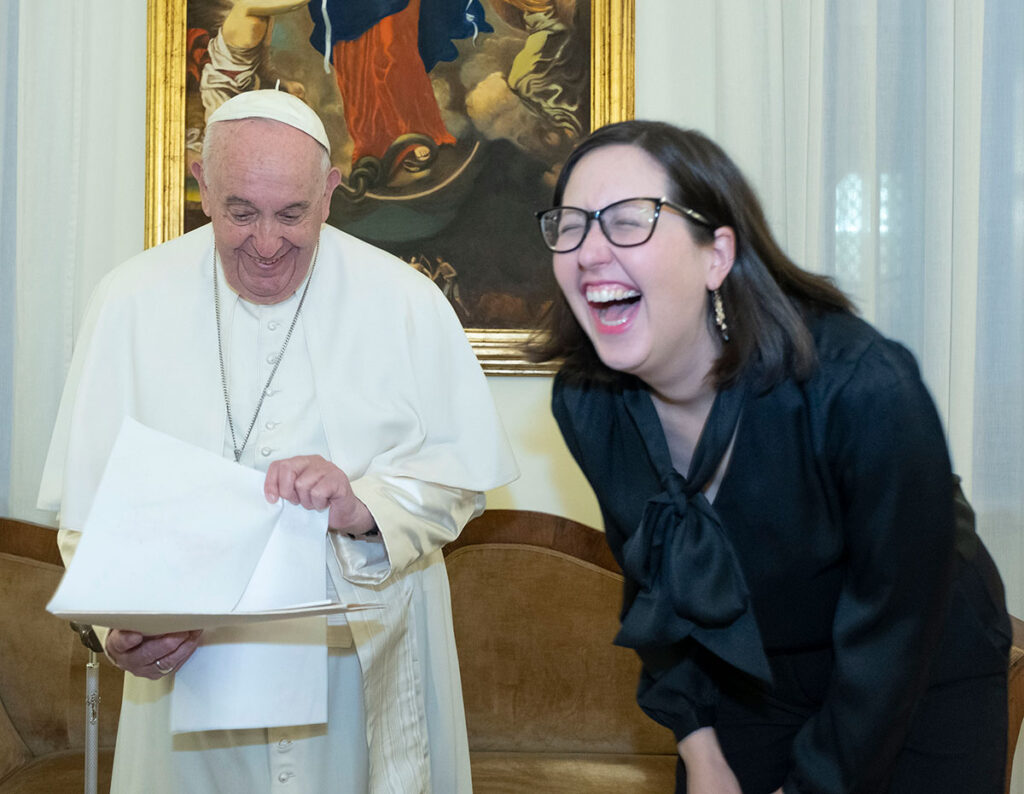
In an essay for America about the trip, Weber described a hectic time preparing for the flight from Hartford, a last minute stop on the way to the airport to buy poppy-colored heels, and an early-morning call to her mother the day of the interview when her nerves kept her from sleep.
The interview itself was calm. The pope spoke in his native Spanish. The America interviewers took turns asking questions through a translator. Weber posed two. She asked about the relationship between American Catholics and the U.S. bishops conference in light of a 2021 America Media survey in which only 20% of Catholics described the United States Conference of Catholic Bishops as “very trustworthy” on matters of faith and morals. And she asked about the church’s pastoral response to women who are pained because they are excluded from being ordained as Catholic priests.
In response to how the bishops conference can regain the trust of American Catholics, Pope Francis said, “Jesus created bishops. Jesus did not create bishops’ conferences … The grace of Jesus Christ is in the relationship between the bishop and his people,” not the conference and the public.
“It was a very quotable answer,” Weber said. “And while it wasn’t necessarily surprising, it was a good reminder that the conference is made up of individual bishops, and it’s the individual bishop’s relationship to the people he serves that matters most.”
Weber also asked, “What would you say to a woman who is already serving in the life of the church, but who still feels called to be a priest?”
Francis responded, “It is a theological problem,” and gave a theological answer. He described two principles — the Petrine, proceeding from the apostle Peter, and the Marian, proceeding from Mary, the mother of Jesus — calling the Petrine principle that of ministry, and the Marian the principle “where the church sees a mirror of herself because she is a woman and a spouse.” While the Marian principle is “more important,” the pope said, “we have not developed a theology of women that reflects this.”
I think he clearly explained teaching on the matter, but I wish he had addressed the pastoral dimension. We need to talk about the pain that many feel in response to church teaching.
Kerry Weber ’04
Francis said that objection to the church’s teaching may be because “we have too often failed in our catechesis when explaining these things.” He affirmed the exclusively male priesthood, saying of women priests, “the Petrine principle has no place for that … That a woman does not enter into the ministerial life is not a deprivation.”
Weber said she had hoped that Francis would focus less on describing the specific teaching and more on the person affected by it.
“I think he clearly explained teaching on the matter, but I wish he had addressed the pastoral dimension,” she said. “We need to talk about the pain that many feel in response to church teaching.”
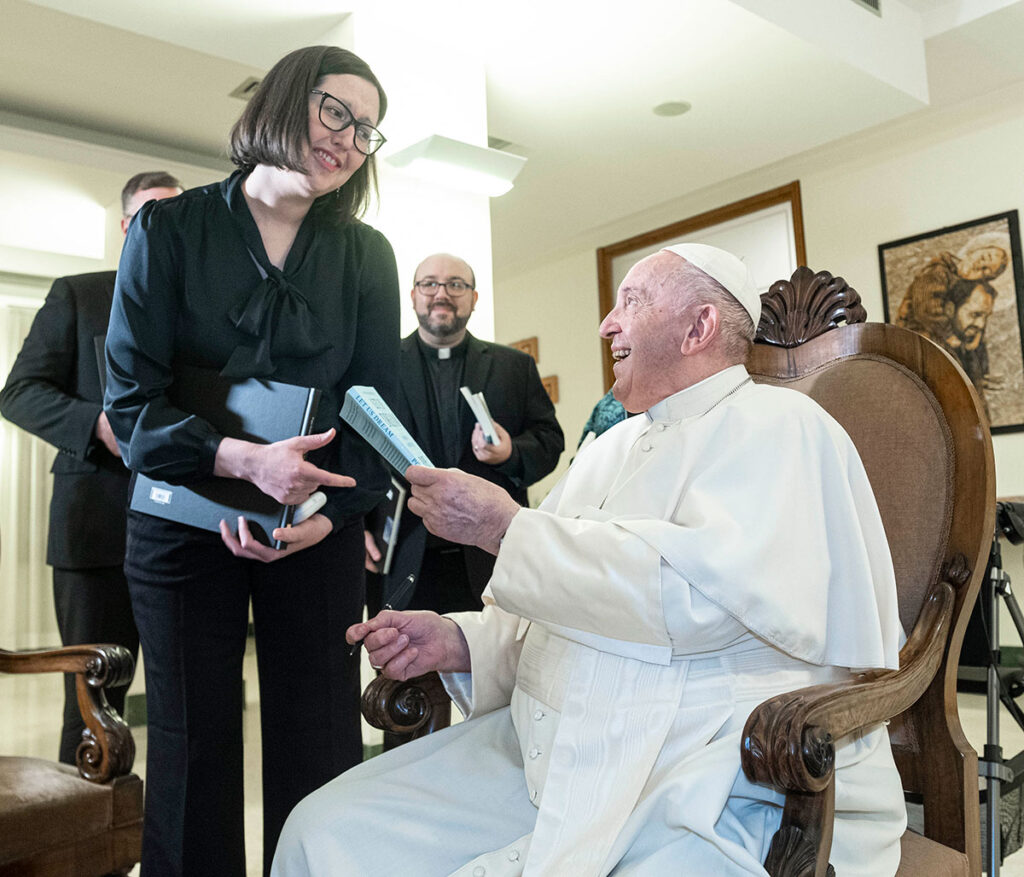
Weber and her associates felt a palpable sense of authentic presence from the pope. While questions and answers were being translated, she had the opportunity to quietly observe him.
“He acted like he had nowhere else to be, even though he absolutely did. He chose to spend this time with us. And as he conversed with us, he continued choosing. There was no sense of rush or hurry from Pope Francis. He was there as pope — somebody being interviewed — but also a pastor,” she said.
“We went into the interview thinking we’d have an hour, but he gave us almost two. We were conscious of that fact that he could be whisked away at any moment, so we tried to get as many different questions in as possible.”
Weber works closely at America with Pope Francis’ confreres in the Society of Jesus — the Jesuits. Dominican friars are recognizable by their white habits; Jesuits wear the same standard Roman collar as diocesan priests or dress similarly to their lay colleagues. Both are known for their scholarship and teaching. Before she worked with the Jesuits, Weber studied with the Dominicans, at PC and at Blackfriars, Oxford, during her junior year abroad.
“I always appreciated the friars’ ability to preach. Their homilies were well crafted and thoughtful. They spoke to my experience as a student, but not in a way that felt like they were trying to be ‘cool,’” Weber said.
She admires the way that both Dominicans and Jesuits authentically live their charisms, or particular missions; while distinct, they are more alike than different, she believes.
“Both charisms require real faith, real freedom,” Weber said.
There are very few limits to what we can publish because everything can be viewed through the lens of faith.
Kerry Weber ’04
Among the mottos of the Jesuits is “Find God in all things” — a fitting description of America magazine’s scope of content and editorial approach.
“There are very few limits to what we can publish because everything can be viewed through the lens of faith,” Weber said. “Bishops’ conferences, Netflix series, public policy, ministry to people in need, Vatican goings-on — we cover it all. It’s a magazine that exists at the intersection of the church and the world, where the Jesuits have always been.”
At America’s offices in New York City, in a large 11th-floor suite overlooking Sixth Avenue and proximate to Rockefeller Center, clergy and lay staff alike go by their first names. Far from reflecting a lack of respect, Weber says this practice is born of mutual respect.
“We’re real partners here. There isn’t a sense of hierarchy, of Jesuits over lay staff. We work as colleagues, as friends, and as brothers and sisters in Christ,” Weber said.
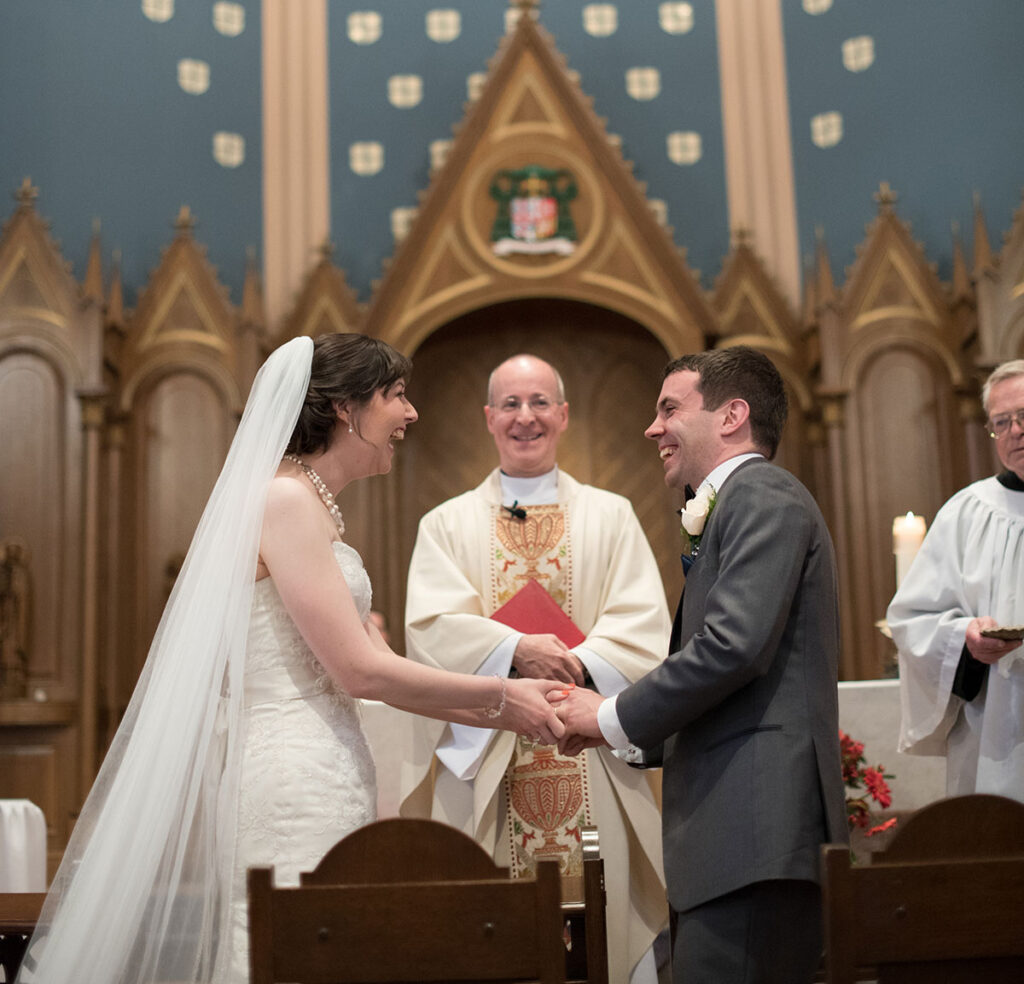
One of Weber’s closest associates and mentors at America is editor-at-large Rev. James Martin, S.J., a New York Times best-selling author and consultant to the Vatican’s Secretariat for Communications, who officiated at her wedding in 2015. Father Martin is known in the church and in the media for his ministry to the LGBTQ community, which he has described as a process of “building a bridge,” drawing both praise and criticism from voices in the church. He spoke at Providence College as part of its centennial celebration in 2016.
Weber’s role at America has evolved since she was first hired as an assistant editor, a job that included reviewing, editing, and writing features for print and web and co-managing social media. She wrote about everyone from Flannery O’Connor (one of her favorite authors) to comedian Tracy Morgan and everything from Catholic education to the Winter Olympics.
In October 2013, Weber was awarded an Egan Journalism Fellowship from Catholic Relief Services to travel to Rwanda. She spent a week with three other fellows examining the reconciliation process in the two decades since the 1994 genocide.
“It was hard to hear the survivors’ stories, but as hard as it was to hear, they actually lived it,” Weber said. “I knew that in writing about their experience, I had a duty to share their story carefully, accurately, and compassionately.”
She was particularly moved by reconciliation groups where victims’ families sat side-by-side with perpetrators of the genocide and shared their stories.
“There was pain, but there was so much grace. I was very grateful to witness it,” Weber said.
Weber’s journalistic assignments are the realization of a lifelong aspiration to write. Her mother was a longtime writer for the Catholic Observer, the former newspaper of the Roman Catholic Diocese of Springfield, Massachusetts, until her retirement in 2016. Kerry grew up visiting the newsroom and hearing about her mother’s work, and she worked for the Observer during her summer breaks in high school and college.
“I’ve basically been working in the Catholic press in one way or another since I was 16,” she said.
Though Weber briefly worked as a staff reporter for the Greenwich Post in Connecticut, “I kept being drawn back to stories about faith. Not as many journalists seek to tell these stories,” she said. By the time she joined America, “Catholic journalism was a choice — a vocation.”
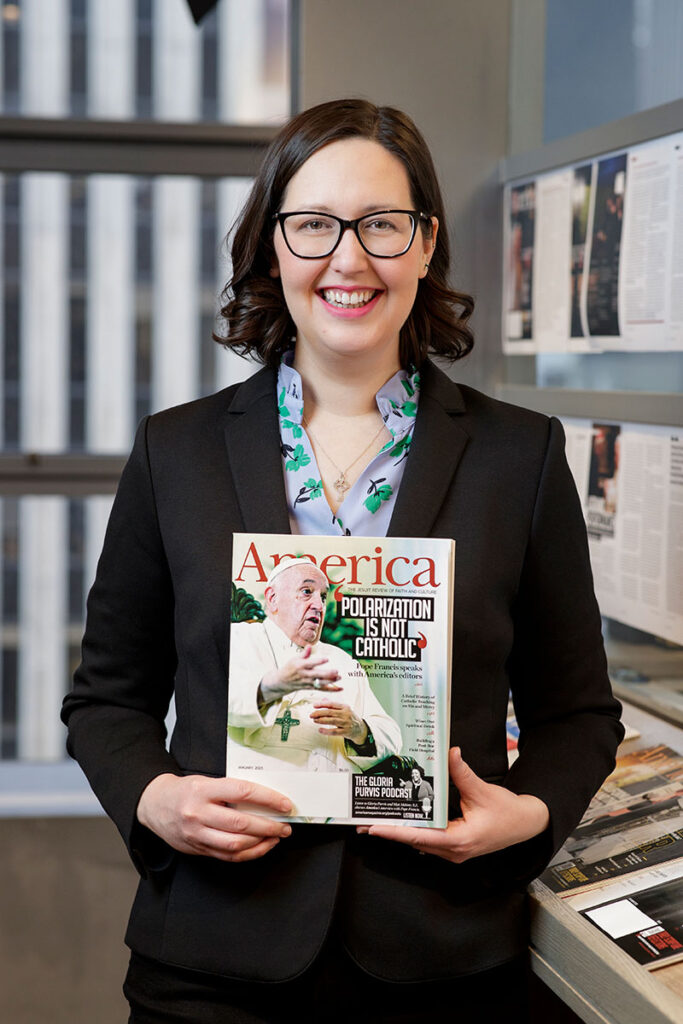
Weber’s work in the Catholic press has been influenced by her studies at PC. She is grateful for how her years there shaped her, and now laughs at the memory that she almost didn’t apply to her mother’s alma mater because she was eager to forge her own path.
“You can imagine my frustration when I visited campus and had to admit that I really did like it,” she said.
When Weber moved into the fourth floor of McVinney Hall in 2001, among her worries was the Development of Western Civilization Program and its academic demands. Today, she cites the classes as one of her most formative intellectual experiences.
“I still draw on Civ regularly in my work at America,” she said.
Outside the classroom, she served in Campus Ministry and as an admission ambassador. Some of her favorite experiences were Habitat for Humanity spring break trips. After graduating, she joined the Mercy Volunteer Corps and taught pre-vocational skills to Navajo children ages 14- 21 at a non-profit special education school in St. Michael’s, Arizona. Through the example of the Sisters of Mercy, she developed an abiding devotion to the virtue of mercy.
That devotion led to reflection and, ultimately, a book. In 2014, Mercy in the City: How to Feed the Hungry, Give Drink to the Thirsty, Visit the Imprisoned, and Keep Your Day Job, was published by Loyola Press. It narrated her personal effort, over the course of one Lenten season, to practice the seven corporal works of mercy derived from Jesus’s teaching in the Gospel of Matthew.
Practicing mercy is “a process, akin to sweeping the floor. You have to do it regularly,” Weber writes in Mercy in the City. “The Works of Mercy aren’t things that can be completed the way one can finish playing a board game or painting a picture.”
Weber sees Pope Francis as a model of mercy. She cites him in the epigraph for Mercy in the City: “The ministers of the church must be ministers of mercy above all.”
“Pope Francis sees his role as pope as one where he is a pastor first, and so much of that comes from his Jesuit formation. He very much lives out the Jesuit motto of men and women for others,” Weber said.
Reflecting on the interview, Weber said that as the pope spoke, it struck her “that his answers were part of an ongoing conversation” about the church and the Catholic faith.
Pope Francis is very open, and he’s not afraid. He’s willing to dwell in the messiness of the world. It’s a very Jesuit approach.
Kerry Weber ’04
That conversation is at the heart of Francis’ papacy. He is better known for frank comments than precise dogmatics. He called a global synod, or meeting of bishops, on synodality, a principle and process he defines as “a style, a walk together, what the Lord expects from the church of the third millennium.” Significantly, preparation for this forthcoming synod of bishops has involved direct input from laypeople through conversation at the diocesan and even parish level.
“Pope Francis is very open, and he’s not afraid. He’s willing to dwell in the messiness of the world. It’s a very Jesuit approach. There’s no point when life is not going to be messy, which is why faith, mercy, and pastoral care are so vital,” Weber said.
At the Vatican, Weber felt her own story come full circle. In the Vatican Museums, she stood in front of Raphael’s fresco “The School of Athens,” a work she vividly remembered learning about in Civ.
“I saw it on a slide then,” Weber said. “But seeing it in Rome on my way to interview the pope, I could see how all my experiences — at PC, in my career, and everything in between — were connected. And I felt so much gratitude for how they led me to where I was, not just into the home of Pope Francis, but into a deeper relationship with God.”





